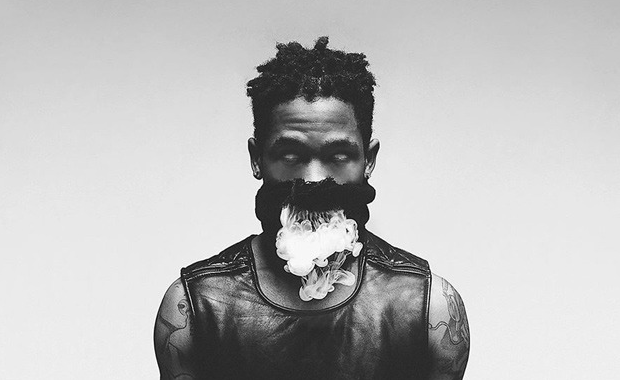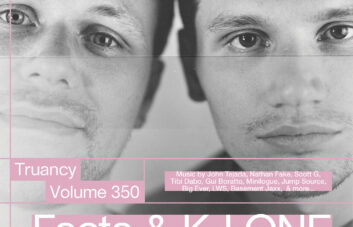You probably know Travis Scott as the mysterious protege of Kanye West. You may have seen him on the 2013 XXL Freshman List and you may have seen him in the credits of Kanye’s Cruel Summer and Yeezus. You’ve probably heard controversies surrounding stolen artwork and betrayed associates. With no standout single to his name, his production influence has become his namesake. Travis is a rapper/producer from a middle-class suburban city in Texas near Houston, and if his vocals aren’t recognisable enough his drums are his trademark. Out of obscurity, he rose to fame by way of a Kanye endorsement that labeled him the carrier of the sound and sonics pioneered on albums like Yeezus. He refers to himself as La Flame; a personification of his musical personality in the form of kinetic and dynamic beats. While he lacks the lyrical substance and political stance of Kanye, he’s just as left field (if not even further left) as Yeezy and matches the emotional capacity of fellow G.O.O.D. Music signee Kid Cudi. Like Kid Cudi, Travis doesn’t hinge his songs on lyrical content but rather the emotional output via tone and production; Travis has managed to frame a sound based on bizarro rap that fuses trap with experimental tendencies.
Travis Scott’s debut LP Owl Pharoah had all the necessary introductory components but floundered in terms of its experimentation by getting a little too weird at times. It was a true post-modern take on 808s & Heartbreaks, taking cues from what Kanye established in 2008 and remolding it for 2013. Its simple cadence changes and touches on varying flows (like a cross between Migos and Kid Cudi) were a highlight next to the beats and effects of Pharoah. With 2014’s Days Before Rodeo, the free album leading up to 2015’s major label debut Rodeo, Travis has nearly perfected his knack for experimentation whether it’s the distorted vocals, more 808s & Heartbreaks-type crooning or delivery in his flow. One thing Travis Scott has always been known for is his drums, and that couldn’t be clearer on this album. During Kanye’s press circuit last summer, he mentioned that “nobody has drums like Travis Scott” and it’s true. Older songs like “God Level” and “Quintana” have a certain knock to them that bellows out of the smoke and jabs you in the gut with each bass hit. It’s an unmistakable sound; right next to his raspy blunt-roasted vocals split between robotic codeine-fueled autotune.
On Days Before Rodeo, you’ll find familiar Scott ad-libs (“straight up!”, “La Flame!”) alongside some compelling one-liners (“Mama worked for AT&T and we never got that service/She stayed in-and-out that hospital, you know that made me nervous” on “Backyard“) and impressive sonics. Scott’s known to toy with vocals, sometimes sounding like a downpitched demon and other times a cyborg powered by lean. He’s only 22, so he has plenty of time to figure out his sound but currently he’s tinkering with a formula composed of hard drums, distorted vocals and party-rage themes. But imagine when and if Travis puts together a MBDTF-type album in five years or so and we look back through his catalog to all these points of the La Flame persona.. My Beautiful La Flame Fantasy.
Songs like “Skyfall” (featuring 2014’s hottest rapper Young Thug) accredits this belief with one of the most beautiful songs of the year. The line between themes has blurred, but it seems Scott and Thug are comparing drug dependency to the necessity (or irrelevancy rather) of veteran rappers in the rap game. “Don’t Play” featuring Big Sean and a band called The 1979 is a nice single to lead into the album’s release, with Travis unleashing a fierce flow across a fluctuating beat. The video accompanying the song borrows some of Kanye’s Americana tendencies as seen in the “Bound 2” video and draws it out a bit further. “Mamacita” features production by DJ Dahi and Metro Boomin (as well as Travis) and another great guest spot by Young Thug that sounds organic alongside Rich Homie Quan. “Drugs You Should Try It” is Scott at his most Heartbreak as he sings in his cyborg tune over a smooth guitar riff and darting bass knocks. “Sloppy Toppy” benefits from a Migos and Peewee Longway feature that starts off with a wild soul sample only to fold into a beat that could go on for eternity with its sleepy bells backed by strings and epic crescendos. The scope of sounds is wide on Days Before Rodeo, and “Backyard” shows Travis is even capable of hearkening back to old-school hip-hop style beats through his sampling.
If there’s one flaw to the album, it’s not in its songs necessarily but the background of its development. In interviews with Sway and Hot 97 last month, Scott was quick to emphasise Days Before Rodeo was an album for Houston by a Houston artist asserting it as the new sound of Houston instead of the screwed-and-chopped, Southern trap music H-Town was known for in the previous decade. Yet all of the features (aside from Big Sean) on the album are entirely Atlanta-based (Young Thug, Migos, Peeway Longway, Rich Homie Quan) which makes one wonder how loyal Scott is to his regional roots. There’s no doubt Atlanta has taken the hip-hop throne with the Migos’ most-copied-flow-of-the-decade and Thug’s sheer innovation, not to mention ATL’s Metro Boomin (Future’s “Honest” album, 2 Chainz, Migos, Gucci Mane, etc.) co-produced three of the best tracks on the album (“Mamacita”, “Skyfall”, “BACC”). Alas, these are the problems of 2014 when certain sounds and artists become staples to every project if they want relevancy. The anthem-like, arena ambitions of Days Before Rodeo does its job as a prelude to Scott’s label debut more than well.





i love mr. foster